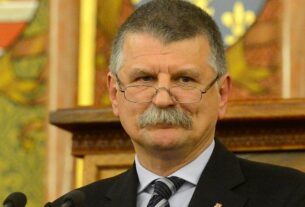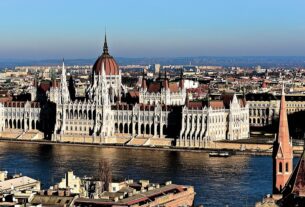The government has organised its response to the new coronavirus outbreak along the policing, military, health-care and economic aspects of combatting the epidemic, Prime Minister Viktor Orbán said. “We will have to succeed on four battlefields simultaneously,” Orbán said in an online press conference.
The epidemic in Hungary is “growing by leaps and bounds” and nearing the stage of mass infections, Orbán said, noting that the number of confirmed cases had risen to 167 by Monday morning. There are only estimates of the number of people who have actually contracted the virus, Orbán said. It is “certainly” much higher than the confirmed 167, he said.
Of those confirmed to have the virus, 108 are carriers without symptoms, Orbán said. Of those showing symptoms of Covid-19, 27 are mildly ill and will probably recover. Nine patients are gravely ill and in intensive care, he said. All 7 fatalities had chronic illnesses, and their average age was 69, Orbán said.
Regarding economic measures, Orbán said a total of 81,480 small companies will benefit from a tax exemption until June 30. Like the exemption granted for taxi drivers, entrepreneurs such as hairdressers, beauticians, decorators, electricians, plumbers, carpenters, as well as artists and providers of health, sports, and some welfare services will be exempted from paying the Itemised Tax for Small Businesses (KATA), he said. Orbán said businesses will be granted an extended deadline to settle their “kata” tax arrears accumulated before March 1, to be paid in the first quarter after the state of emergency is lifted. Media providers will also be exempted from paying their tax on lost advertising revenues, the prime minister said.
Evictions, property seizures and tax collection procedures will be suspended, and taxpayers will not be required to pay their arrears until after the end of the state of emergency, he said. Young mothers whose right to child benefits would terminate during the state of emergency, will continue to receive their benefits, the prime minister said.
Meanwhile, Orbán said that doctors and nurses working with patients in intensive care will be provided special masks starting on Tuesday morning. All other doctors and nurses in hospital will be given surgical masks, he added.
Orbán asked everyone to handle resources economically, saying the country was preparing for a protracted epidemic. The government is working on protecting jobs, Orbán said. Those who lose theirs will be helped to find a new one as soon as possible, he said.
Regarding protective equipment, Orbán said Hungary currently has 1.5 million surgical masks, with 25,000 being manufactured daily. Production is being ramped up to 80,000 a day, he said. The country has 2,560 ventilators, he added. Hungary has ordered “huge batches” of protective gear “from the East”, Orbán said, with over ten planes expected to deliver the goods.
Concerning details of Hungary’s hospital capacity, Orbán said the country has 66,906 hospital beds, 19,431 doctors under the age of 65, 4,312 residents and 900 medical students in their final year, making up a total medical staff of 24,643, adding that the number of nurses younger than 65 totalled 105,000.
The prime minister said that the country has 70,275 operative police officers under 65, and 46,573 volunteers such as civilian guards. The Hungarian military has 23,950 professional soldiers and 9,381 reserve troops, while there are 10,649 former soldiers that quit the army during the past five years, Orbán said, adding that they take a crucial role in border control and are making preparations to cooperate with the police should street patrols become necessary. Altogether 139,684 officers are on hand currently to maintain public order, including the enforcement of quarantine or curfew regulations, should the need arise, Orbán said.
Orbán confirmed that foreigners on their way to their homelands can continue crossing Hungary through designated corridors. He said that humanitarian aspects continued to be important, adding that “we want to make our neighbours friends”. Orbán said he expected a difficult period to come, which would require personal sacrifices from everyone.
“The more we cooperate the more lives we will be able to save. We are facing a task that nobody could tackle alone. Every one of us has a responsibility … rather than divisions and disputes the time has come to work together.”
The Hungarian government will handle the crisis brought on by the new coronavirus epidemic even if the opposition does not vote to prolong the state of emergency, Prime Minister Viktor Orbán said in parliament on Monday, ahead of the debate of the government’s epidemic response bill which has been slammed by opposition lawmakers who say the bill hands the government excessive powers.
Speaking in parliament after his speech detailing the government’s response to the crisis so far, Orbán said: “The situation is difficult and worse is to come.” Orbán called on ruling party lawmakers to “be brave … the 133 bravest people in the country”, and vote for the measures to help the country. “Never mind what the opposition is afraid of,” he said. Pro-government lawmakers “should not flinch”. Regarding the timeframe of a prolonged state of emergency rejected by the opposition, Orbán said the government did not need a fixed time limit. Parliament, he said, would have the right to “call it quits” every day. If it passes the law, parliament will have the power to strip the government of its special powers any day, he said.
Of the 90 day limit proposed by multiple opposition parties, Orbán said the country “will be in worse shape in 90 days than it is now”. The protective measures put in place are aimed at slowing down the epidemic so that it does not overwhelm the health-care system, he said. The slower the epidemic spreads, the longer it takes to run its course, Orbán said. “It will be a lot longer than three months.”
The measures taken so far are sufficient, Orbán said. Although new steps will be necessary, “there is no need to underestimate the fact that we have left 3,600 billion forints [EUR 10.2bn] in people’s pockets,” he said.
Regarding schools, Orbán said schools were not closed but were operating in the digital domain. Students, he added, would still have a chance to finish the academic year.
On the issue of ordering a curfew, Orbán said the government was keeping that possibility on the agenda, even though a total curfew, he added, would probably be impossible to impose. Currently, Hungary is heeding the experiences of other countries, primarily Austria’s, he said.
Addressing the economic proposals of opposition parties to offset the impact of the epidemic, Orbán insisted that they had largely proposed austerity measures. Such steps would cost the country jobs, and the government, he said, was working to preserve them. They aim to provide jobs as opposed to welfare, he said.
MTI










